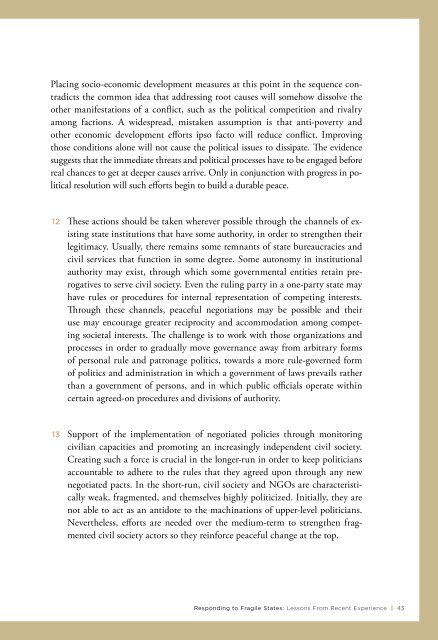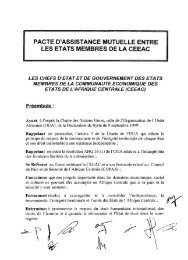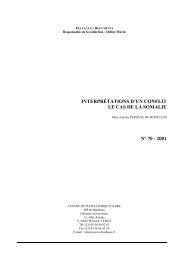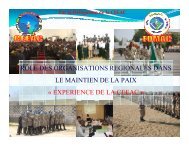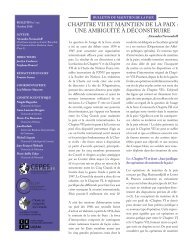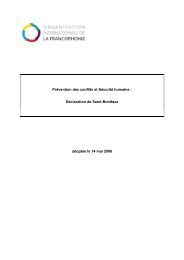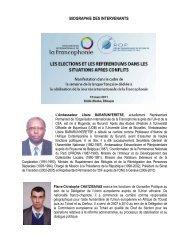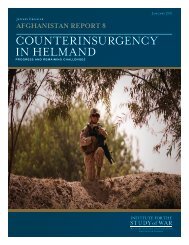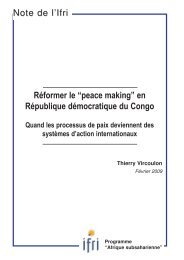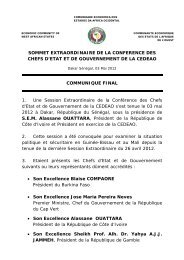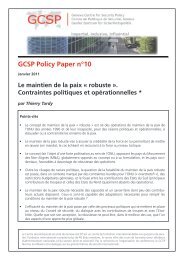engaging fragile states - Woodrow Wilson International Center for ...
engaging fragile states - Woodrow Wilson International Center for ...
engaging fragile states - Woodrow Wilson International Center for ...
You also want an ePaper? Increase the reach of your titles
YUMPU automatically turns print PDFs into web optimized ePapers that Google loves.
Placing socio-economic development measures at this point in the sequence contradicts<br />
the common idea that addressing root causes will somehow dissolve the<br />
other manifestations of a conflict, such as the political competition and rivalry<br />
among factions. A widespread, mistaken assumption is that anti-poverty and<br />
other economic development ef<strong>for</strong>ts ipso facto will reduce conflict. Improving<br />
those conditions alone will not cause the political issues to dissipate. The evidence<br />
suggests that the immediate threats and political processes have to be engaged be<strong>for</strong>e<br />
real chances to get at deeper causes arrive. Only in conjunction with progress in political<br />
resolution will such ef<strong>for</strong>ts begin to build a durable peace.<br />
12 These actions should be taken wherever possible through the channels of existing<br />
state institutions that have some authority, in order to strengthen their<br />
legitimacy. Usually, there remains some remnants of state bureaucracies and<br />
civil services that function in some degree. Some autonomy in institutional<br />
authority may exist, through which some governmental entities retain prerogatives<br />
to serve civil society. Even the ruling party in a one-party state may<br />
have rules or procedures <strong>for</strong> internal representation of competing interests.<br />
Through these channels, peaceful negotiations may be possible and their<br />
use may encourage greater reciprocity and accommodation among competing<br />
societal interests. The challenge is to work with those organizations and<br />
processes in order to gradually move governance away from arbitrary <strong>for</strong>ms<br />
of personal rule and patronage politics, towards a more rule-governed <strong>for</strong>m<br />
of politics and administration in which a government of laws prevails rather<br />
than a government of persons, and in which public officials operate within<br />
certain agreed-on procedures and divisions of authority.<br />
13 Support of the implementation of negotiated policies through monitoring<br />
civilian capacities and promoting an increasingly independent civil society.<br />
Creating such a <strong>for</strong>ce is crucial in the longer-run in order to keep politicians<br />
accountable to adhere to the rules that they agreed upon through any new<br />
negotiated pacts. In the short-run, civil society and NGOs are characteristically<br />
weak, fragmented, and themselves highly politicized. Initially, they are<br />
not able to act as an antidote to the machinations of upper-level politicians.<br />
Nevertheless, ef<strong>for</strong>ts are needed over the medium-term to strengthen fragmented<br />
civil society actors so they rein<strong>for</strong>ce peaceful change at the top.<br />
Responding to Fragile States: Lessons From Recent Experience | 43


